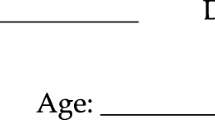Abstract
This study assessed the relationships between the General Attitude and Belief Scale (GABS) and measures of 1) irrational beliefs derived from Ellis' older and newer theorizing, 2) reasoning errors based on Beck's theory, and 3) affective and behavioral disorder, specifically depression and bulimia. Female undergraduates (n=160) completed the GABS, Irrational Beliefs Scale, Irrational Beliefs Test, Rational Behaviors Inventory, Dysfunctional Attitude Scale, Cognitive Error Questionnaire and the Beck Depression Inventory, Center for Epidemiologic Studies — Depression Scale, and Bulimia Test. Results supported the internal consistency and construct validity of the GABS; progressively higher correlations were obtained with measures more similar to the GABS theoretically.
Similar content being viewed by others
References
American Psychiatric Association (APA) (1980).DSM-III: Diagnostic and Statistical Manual of Mental Disorders (3rd edition). Washington D.C.: American Psychiatric Association.
Beck, A. T. (1967).Depression: Clinical, experimental and theoretical aspects. New York: Harper & Row.
Beck, A. T. (1976).Cognitive therapy and the emotional disorders. New York: International Universities Press.
Beck, A. T., Rial, W. and Rickeis, K. (1974). Short form of depression inventory — a cross validation.Psychological Reports, 34, 1184–1186.
Bernard, M.E. (1990). Validation of General Attitude and Belief Scale. Paper presented at the World Congress on Mental Health Counselling. Keystone, Colorado, June, 1990.
Burgess, P. (1986). Belief systems and emotional disturbance: An evaluation of the rational-emotive model. Unpublished doctoral dissertation: University of Melbourne, Parkville, Victoria, Australia.
Burgess, P. (1990). Toward resolution of conceptual issues in the assessment of belief systems in Rational-Emotive Therapy.Journal of Cognitive Psychotherapy: An International Quarterly, 4, 171–183.
DiGiuseppe, R. and Leaf, R.C. (1990). The endorsement of irrational beliefs in a general clinical population.Journal of Rational-Emotive and Cognitive-Behavior Therapy, 8, 235–247.
DiGiuseppe, R., Leaf, R., Exner, T. and Robin, M.W. (1988). The development of a measure of irrational/rational thinking. Presented at theWorld Congress on Behavior Therapy, Edinburgh, Scotland, September 6.
Dobson, K.S. and Shaw, B.F. (1986). Cognitive assessment with major depressive disorders.Cognitive Therapy and Research, 10, 13–29.
Dryden, W. & Ellis, A. (1988). Rational-emotive therapy. In Dobson, K. S. (Ed.),Handbook of cognitive-behavioral therapies (pp. 214–272). New York: Guilford.
Ellis, A. (1984a). The essence of RET.Journal of Rational-Emotive Therapy, 2, 19–25.
Ellis, A. (1984b). Is the unified-interaction approach to cognitive-behavior modification a reinvention of the wheel?Clinical Psychology Review, 4, 215–218.
Ellis, A. (1990). The revised ABC's of Rational-Emotive Therapy (RET).Journal of Rational-Emotive and Cognitive-Behavior Therapy, 9, 139–172.
Gotlib, I.H. (1984). Depression and general psychopathology in university students.Journal of Abnormal Psychology, 93, 9–30.
Jones, R.G. (1968). A factored measure of Ellis' Irrational Belief System with personality and maladjustment correlates. (Doctoral Dissertation, Texas Technical College, University Microfilms No. 69-6443).
Lefebvre, M.F. (1981). Cognitive distortion and cognitive errors in depressed and low back pain patients.Journal of Consulting and Clinical Psychology, 49, 517–525.
Lohr, J.M. and Bonge, D. (1982). The factorial validity of the Irrational Beliefs Test: A psychometric investigation.Cognitive Therapy and Research, 6, 225–230.
Malouff, J.M. and Schutte, N.S. (1986). Development and validation of a measure of irrational belief.Journal of Consulting and Clinical Psychology, 54, 860–862.
Parker, G., Bradshaw, G. and Bignault, T. (1984). Dysfunctional attitudes: Measurement, significant constructs and links with depression.Acta Psychiatrica Scandinavica, 70, 90–96.
Rabkin, J.G. and Klein, D.F. (1987). The clinical measurement of depressive disorders. In A.J. Marsella, R.M.A. Hirschfeld and M.M. Katz (Eds.),The Measurement of Depression (pp. 30–86). New York: Guilford Press.
Sanderman, R., Mersch, P., Van Der Sleen, J., Emmelkamp, P.M.G., and Ormel, J. (1987).Personality and Individual Differences, 8, 561–569.
Shorkey, C.T. and Whiteman, V.L. (1977). Development of the Rational Behavior Inventory: Initial validity and reliability.Educational and Psychological Measurement, 37, 527–534.
Smith, M.C. and Thelen, M.H. (1984). Development and validation of a test for bulimia.Journal of Consulting and Clinical Psychology, 52, 863–872.
Smith, T. W. (1989). Assessment in rational-emotive therapy: Empirical access to the ABCD model. In M.E. Bernard and R. DiGiuseppe (Eds.),Inside RET: A critical appraisal of the therapy and theory of Albert Ellis (pp. 135–153). New York: Academic Press.
Smith, T. W. and Zurawski, R. M. (1983). Assessment of irrational beliefs: The question of discriminant validity.Journal of Clinical Psychology, 39, 976–979.
Steer, R.A., Beck, A.T. and Garrison, B. (1986). Applications of the Beck Depression Inventory. In N. Sartorius and T.A. Ban (Eds.),Assessment of Depression (pp. 123–142). Berlin: Springer-Verlag.
Warren, R. and Zgourides, G. (1989). Further validity and normative data for the Malouff and Schutte Belief Scale.Journal of Rational-Emotive and Cognitive-Behavior Therapy, 7, 167–172.
Weissman, A.N. (1979). The Dysfunctional Attitude Scale: A validation study. (Doctoral dissertation, University of Pennsylvania, University Microfilms No. 79-19533).
Weissman, M.M., Sholomskas, D., Pottenger, M. Prusoff, B.A. and, Locke, B.Z. (1977). Assessing depressive symptoms in five psychiatric populations: A validation study.American Journal of Epidemiology, 106, 203–214.
Wertheim, E.H. (1991). Examination of the concurrent and construct validities of the Bulimia Test using normal and bulimic samples.International Journal of Eating Disorders, 10, 361–368.
Wessler, R.A. and Wessler, R.L. (1980).The principles and practice of Rational Emotive Therapy. San Francisco: Jossey-Bass.
Whiteman, V.L. (1979). Development of an Australian version of the Rational Behavior Inventory.Psychological Reports, 44, 104–106.
Whiteman, V.L. and Shorkey, C.T. (1978). Validation testing of the Rational Behavior Inventory.Educational and Psychological Measurement, 38, 1143–1149.
Zurawski, R. M. and Smith, T. W. (1987). Assessing irrational beliefs and emotional distress: Evidence and implications of limited discriminant validity.Journal of Counseling Psychology, 34, 224–227.
Zuroff, D.C., Igreja, I. and Mongrain, M. (1990). Dysfunctional attitudes, dependency, and self-criticism as predictors of depressive mood states: A 12-month longitudinal study.Cognitive Therapy and Research, 14, 315–326.
Author information
Authors and Affiliations
Additional information
Dr. Eleanor H. Wertheim is Senior Lecturer at the Department of Psychology, La Trobe University in Melbourne, Australia. Zeffie Poulakis is associated with the Department of Psychology at La Trobe University where she completed her honours degree, B.B.Sc. (Hons).
The authors thank Christine Brown for helping to recruit subjects and administer measures.
Rights and permissions
About this article
Cite this article
Wertheim, E.H., Poulakis, Z. The relationships among the general attitude and belief scale, other dysfunctional cognition measures, and depressive or bulimic tendencies. J Rational-Emot Cognitive-Behav Ther 10, 219–233 (1992). https://doi.org/10.1007/BF01062376
Issue Date:
DOI: https://doi.org/10.1007/BF01062376



